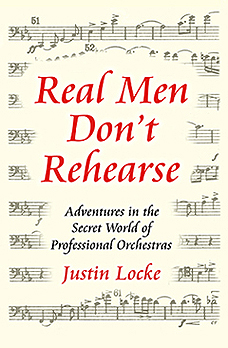Well the annual retail festival is finally over. Many thanks to all who participated.
Now that the main part of the holiday is over, here is my grinchy comment:
We often hear people complaining about the commercialization of Christmas, but I don’t. I am just one of millions of people who benefit from the annual autumn buying frenzy.  Dour economists be damned, I just had my biggest Christmas ever, thanks in part to Johnson Strings (MA) and Bookmark (CA) selling an astonishing number of copies of Real Men Don’t Rehearse, also an amazing number of folks buying t-shirts off my Bass Couture café press site (see links at right).
Dour economists be damned, I just had my biggest Christmas ever, thanks in part to Johnson Strings (MA) and Bookmark (CA) selling an astonishing number of copies of Real Men Don’t Rehearse, also an amazing number of folks buying t-shirts off my Bass Couture café press site (see links at right).
The retail festival is a good thing for the economy as a whole. It replicates the celebration of the harvest. Everybody wins. Hooray.
But the one thing that bothers me the most about Christmas is how it mucks about with our emotions of want.
To illustrate my point, I have a friend who has a very different approach. Whenever his kids say they want something for Christmas, he says, "if you really want it, let’s just go get it– NOW." That way, the kids have no pent up anxiety over potential wish fulfillment.
Due to this unique policy, his actual Dec. 25th Christmas days are not about a lot of opening of presents so much as they are just fun family gatherings. Obviously, they hold off on a few gifts for the ritual of opening a few on the day of, but it isn’t an all or nothing proposition, and so it is quite sane.
As his kids have gotten older, he has also added a unique layaway offer: he guarantees they will get what they want, but if they are willing to wait an extra 9 days, until January 3rd, he also pays them the difference between the pre-Christmas and post-Christmas price. Of course, the kids have been all over that, as with a little patience, they end up with either cash or twice as many toys.
The previous story is not only an excellent example of originality at work, it is also what I call an intelligent management of want.
Our desires . . . our emotions regarding what we want . . . are immensely powerful forces, and to teach children to defer their desires to a distant date that, to a child, must seem like an eternity away– is this smart? And to train them to think their true desire will only be fulfilled if it is recognized and fulfilled by a stranger? Is this smart?? And to say to a kid that if you get your desire fulfilled a week after your target date, which is the same as everyone else’s target date, it is meaningless . . . is this smart???
It is the cultivation and calm application of persistent desire that brings success. It does not come by hoping that some distant mythical being will see your true heart’s desire and give it to you (which, by the way, will apparently only happen if you meet the many conditions laid down for your behavior and comply with a lengthy litany of naughty/nice regulations– ah, ever more conformity training at work.) To think that greater rewards come from obedience and deferred desire, rather than your own persistent patient action is, I think, the wrong message.
If everyone just went out and got what they wanted when they wanted it, and didn't limit so much of their gift giving to occur on December 25th, wouldn't that make it "Christmas throughout the year"?
Happy Holidays.
© Justin Locke
